
9 December 2024
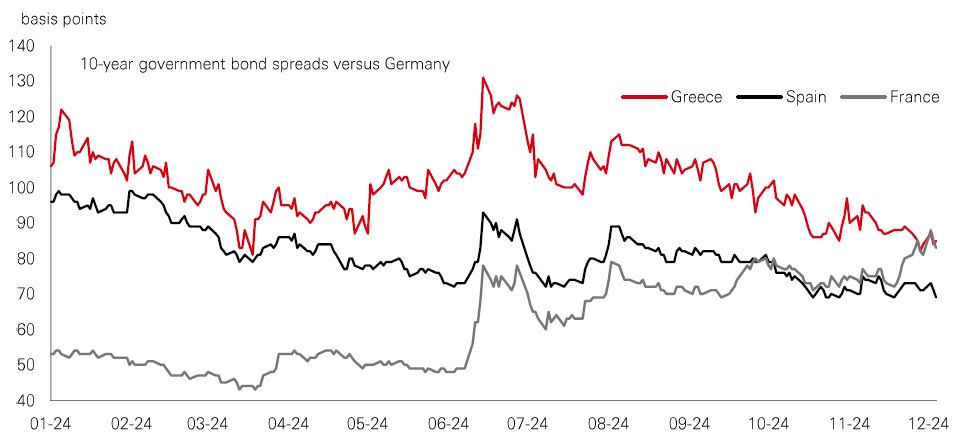
Are good economics now bad politics? Recent developments in France are a case in point. IMF forecasts show the country’s public finances are on an unsustainable path, with the debt ratio expected to reach almost 130% of GDP by the end of the decade. But with the French parliament split into three blocs, there is limited political will to find a solution. French Prime Minister Barnier’s proposed EUR60bn budget consolidation saw him swiftly ejected from office.
Amid the political impasse, France’s 10-year government bond spread over Germany has moved higher, and is now above that of Spain and Portugal. Yet, this is not a marker of an imminent crisis. In the words of financial wags, it's not a “Truss moment”. Spreads in France have not blown out in the same way they did in the UK in September 2022, when then-Prime Minster Truss introduced a budget that incorporated significant unfinanced tax cuts, worsening debt sustainability. No such measures are being touted in France for the time being.
The market reaction to last week's events in France has been sanguine. That reflects today's better economic reality versus 2022 – ongoing disinflation, central bank rate cuts, and decent global growth. The ECB also provides an ultimate backstop against disorderly market dynamics in the eurozone via the Transmission Protection Instrument (TPI), even if this comes with strings attached. So, although events require monitoring, and the distinction between the eurozone core and periphery is blurring, this is likely to be a slow-burn issue rather than the start of a new crisis.
With inflation remaining a bit sticky in places, and fiscal activism still in play, it makes sense that investors expect a fairly shallow rate cutting cycle in 2025. The ability of central banks to insulate the economy and markets against adverse shocks – the so called “Fed put” – looks constrained.
We think many alternative asset classes offer an attractive solution. Hedge funds, for example, have exhibited consistently low correlations to stocks over the past three years. This coincides with a period of higher rates and a higher dispersion of equity returns which typically benefits “stock picking” strategies that hedge funds embed. This contrasts with the 2010s when record-low interest rates were causing nearly all stocks to rise in unison. For 2025, an environment of rising uncertainty and market volatility would likely to keep dispersion high. And for those hedge funds with significant unencumbered cash balances, higher rates would provide a further boost to their total return.
The value of investments and any income from them can go down as well as up and investors may not get back the amount originally invested. Past performance does not predict future returns. For informational purposes only and should not be construed as a recommendation to invest in the specific country, product, strategy, sector or security. Any views expressed were held at the time of preparation and are subject to change without notice. Any forecast, projection or target where provided is indicative only and is not guaranteed in any way. Diversification does not ensure a profit or protect against loss. Source: HSBC Asset Management. Macrobond, Bloomberg. Data as at 7.30am UK time 06 December 2024.
Barring a major shock between now and the new year, US stock markets are set to notch up world beating performance in 2024. To many, this comes as no surprise in a year where the soft landing was delivered, profit growth rebounded, and AI started delivering on its huge potential. But where does this leave us for 2025?
We think US markets can continue to perform well. The prospects of tax cuts and deregulation is the icing on top of the cake that is a resilient US economy. Profit growth is likely to remain strong, even if current expectations of c. 15% for 2025 EPS growth look somewhat optimistic.
But a key challenge will be valuations. Decomposing year-to-date equity returns shows multiple expansion has been responsible for the bulk of US gains this year, unlike in emerging markets – particularly in Asia - where profits and dividends have driven stocks higher. This leave US stocks trading on a 12-month forward PE of 22.0x, well above the last 10-year average of 18.6x. Stretched US valuations, along with a “broadening out” of profit growth across the world, make it important to look beyond recent winners.
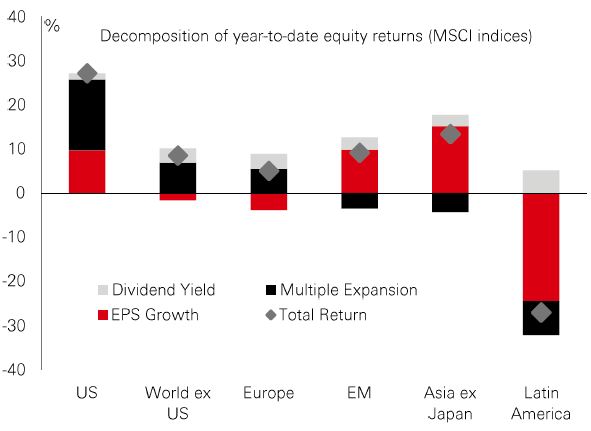
Despite a good start to 2024, European equities have struggled for momentum since the summer, while US stocks have zipped ahead. Year-to-date, this leaves European stocks experiencing their worst relative performance to the US in close to 50 years.
Investor pessimism around Europe is perhaps unsurprising. The export-dependent bloc is weighed down by weak global trade growth, exposure to soft Chinese demand, and competition from China’s lower cost carmakers. German Fortune 500 companies have announced over 60,000 layoffs this year with more expected to come. On top of the bad economic news, the region’s politics looks troubling (see main story).
The outcome is a European market that now looks very cheap. MSCI Europe is on a trailing PE of 15.3x versus 30x for the US. At the sector level, discounts look particularly pronounced for consumer staples, healthcare, financials and industrials. So, although caution is warranted, some re-rating is possible – triggered perhaps by scope for China’s reflation, or government support for domestic “world-class” brands. A weaker euro helps. And bargain hunters are likely to be out in force, making M&A and buyback activity a potential boost in 2025.
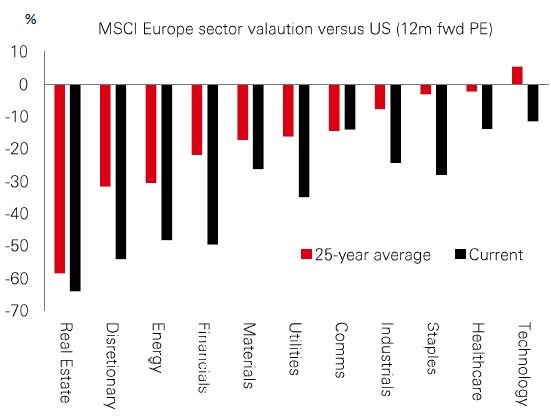
2024 has been a great year for Asia’s credit markets, especially for high-yield bonds. The benchmark JACI high-yield index has delivered double-digit returns. Following a tough period for the market post-pandemic, several factors have reignited investor enthusiasm.
Firstly, exposure to China has fallen considerably as troubled real estate names have defaulted and dropped off indices. This “flushing out” process has resulted in a market that is not only more geographically and sectorally diverse, but also has a much lower average default rate. Many companies now operate with healthy balance sheets and easy access to cheap local funding channels.
This leaves the asset class in a strong position for 2025. Yields remain higher versus historical levels and DM equivalents, providing room for further spread compression. Of course, China’s macro situation is a key risk to monitor, and there is likely to be noise around tariffs. But improved diversification – including increased exposure to fast-growing India – and ongoing China’s stimulus measures should limit the downside.
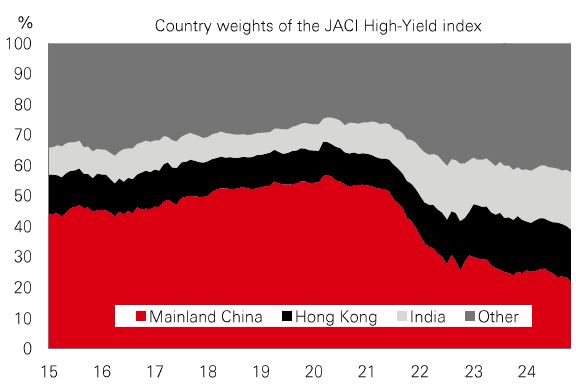
Past performance does not predict future returns. The level of yield is not guaranteed and may rise or fall in the future. For informational purposes only and should not be construed as a recommendation to invest in the specific country, product, strategy, sector or security. Any views expressed were held at the time of preparation and are subject to change without notice. Index returns assume reinvestment of all distributions and do not reflect fees or expenses. You cannot invest directly in an index. Any forecast, projection or target where provided is indicative only and not guaranteed in any way. Source: JP Morgan, HSBC Asset Management. Macrobond, Bloomberg, Datastream. Data as at 7.30am UK time 06 December 2024.
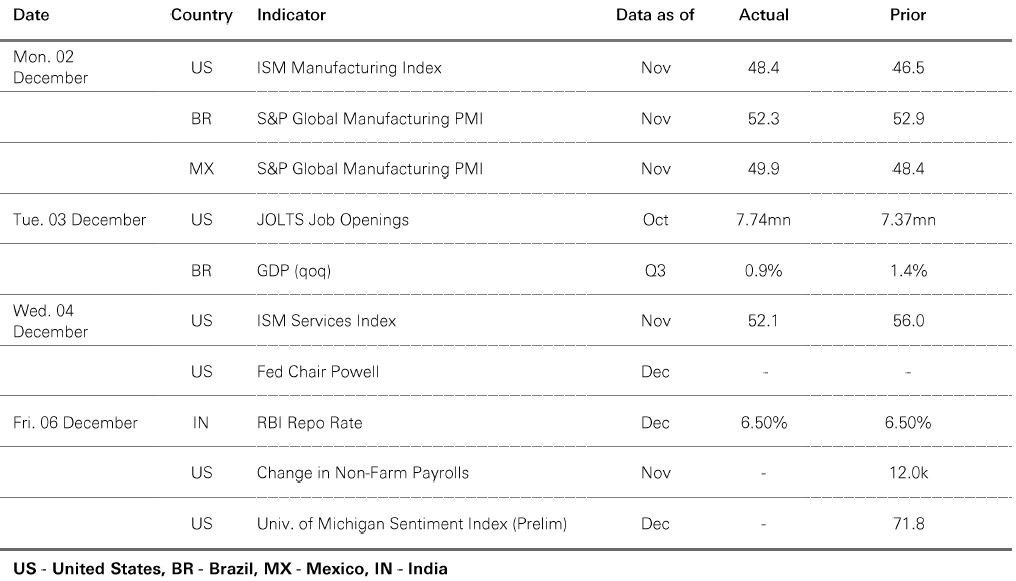
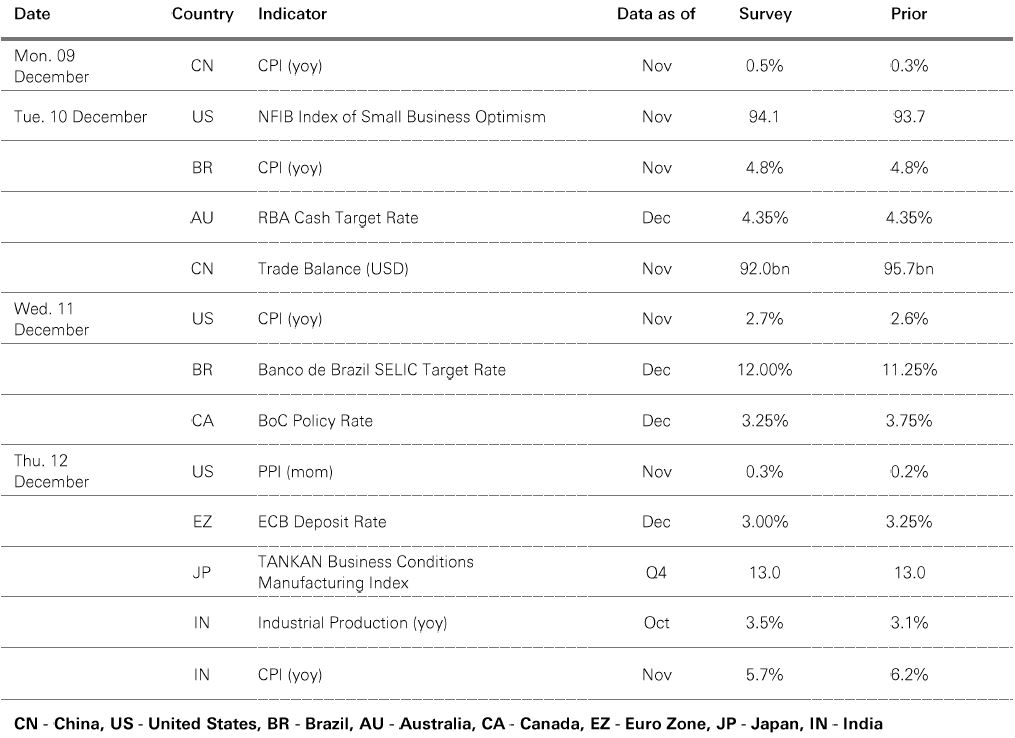
Source: HSBC Asset Management. Data as at 7.30am UK time 06 December 2024. For informational purposes only and should not be construed as a recommendation to invest in the specific country, product, strategy, sector or security. Any views expressed were held at the time of preparation and are subject to change without notice.
Positive risk market appetite persists despite increased political tensions, and the US Dollar index consolidated. Core government bonds were range-bound, as Fed Chair Powell stated the Fed “can afford to be a little more cautious” on the path to a neutral policy stance. In US equities, the S&P500 touched an all-time high but lagged the Nasdaq. The Euro Stoxx 50 rallied, with France’s CAC rebounding. The Nikkei 225 strengthened on higher machinery makers as the yen traded sideways (vs USD). EM stock markets were broadly higher, led by India’s Sensex index. The Shanghai Composite and Hang Seng advanced ahead of China’s Central Economic Work Conference whereas rising political worries weighed on South Korea’s Kospi index. In commodities, oil edged higher as the OPEC+’s decided to delay a plan to roll back production cuts to April 2025. Gold edged lower, while copper gained.




This document has been issued by The Hongkong and Shanghai Banking Corporation Limited (the "Bank") in the conduct of its regulated business in Hong Kong and may be distributed in other jurisdictions where its distribution is lawful. It is not intended for anyone other than the recipient. The contents of this document may not be reproduced or further distributed to any person or entity, whether in whole or in part, for any purpose. This document must not be distributed to the United States, Canada or Australia or to any other jurisdiction where its distribution is unlawful. All non-authorised reproduction or use of this document will be the responsibility of the user and may lead to legal proceedings.
This document has no contractual value and is not and should not be construed as an offer or the solicitation of an offer or a recommendation for the purchase or sale of any investment or subscribe for, or to participate in, any services. The Bank is not recommending or soliciting any action based on it.
The information stated and/or opinion(s) expressed in this document are provided by HSBC Global Asset Management Limited. We do not undertake any obligation to issue any further publications to you or update the contents of this document and such contents are subject to changes at any time without notice. They are expressed solely as general market information and/or commentary for general information purposes only and do not constitute investment advice or recommendation to buy or sell investments or guarantee of returns. The Bank has not been involved in the preparation of such information and opinion. The Bank makes no guarantee, representation or warranty and accepts no responsibility for the accuracy and/or completeness of the information and/or opinions contained in this document, including any third party information obtained from sources it believes to be reliable but which has not been independently verified. In no event will the Bank or HSBC Group be liable for any damages, losses or liabilities including without limitation, direct or indirect, special, incidental, consequential damages, losses or liabilities, in connection with your use of this document or your reliance on or use or inability to use the information contained in this document.
In case you have individual portfolios managed by HSBC Global Asset Management Limited, the views expressed in this document may not necessarily indicate current portfolios' composition. Individual portfolios managed by HSBC Global Asset Management Limited primarily reflect individual clients' objectives, risk preferences, time horizon, and market liquidity.
The information contained within this document has not been reviewed in the light of your personal circumstances. Please note that this information is neither intended to aid in decision making for legal, financial or other consulting questions, nor should it be the basis of any investment or other decisions. You should carefully consider whether any investment views and investment products are appropriate in view of your investment experience, objectives, financial resources and relevant circumstances. The investment decision is yours but you should not invest in any product unless the intermediary who sells it to you has explained to you that the product is suitable for you having regard to your financial situation, investment experience and investment objectives. The relevant product offering documents should be read for further details.
Some of the statements contained in this document may be considered forward-looking statements which provide current expectations or forecasts of future events. Such forward looking statements are not guarantees of future performance or events and involve risks and uncertainties. Such statements do not represent any one investment and are used for illustration purpose only. Customers are reminded that there can be no assurance that economic conditions described herein will remain in the future. Actual results may differ materially from those described in such forward-looking statements as a result of various factors. We can give no assurance that those expectations reflected in those forward-looking statements will prove to have been correct or come to fruition, and you are cautioned not to place undue reliance on such statements. We do not undertake any obligation to update the forward-looking statements contained herein, whether as a result of new information, future events or otherwise, or to update the reasons why actual results could differ from those projected in the forward-looking statements.
Investment involves risk. It is important to note that the capital value of investments and the income from them may go down as well as up and may become valueless and investors may not get back the amount originally invested. Past performance contained in this document is not a reliable indicator of future performance whilst any forecasts, projections and simulations contained herein should not be relied upon as an indication of future results. Past performance information may be out of date. For up-to-date information, please contact your Relationship Manager.
Investment in any market may be extremely volatile and subject to sudden fluctuations of varying magnitude due to a wide range of direct and indirect influences. Such characteristics can lead to considerable losses being incurred by those exposed to such markets. If an investment is withdrawn or terminated early, it may not return the full amount invested. In addition to the normal risks associated with investing, international investments may involve risk of capital loss from unfavourable fluctuations in currency values, from differences in generally accepted accounting principles or from economic or political instability in certain jurisdictions. Narrowly focused investments and smaller companies typically exhibit higher volatility. There is no guarantee of positive trading performance. Investments in emerging markets are by their nature higher risk and potentially more volatile than those inherent in some established markets. Economies in emerging markets generally are heavily dependent upon international trade and, accordingly, have been and may continue to be affected adversely by trade barriers, exchange controls, managed adjustments in relative currency values and other protectionist measures imposed or negotiated by the countries with which they trade. These economies also have been and may continue to be affected adversely by economic conditions in the countries in which they trade. Mutual fund investments are subject to market risks. You should read all scheme related documents carefully.
Copyright © The Hongkong and Shanghai Banking Corporation Limited 2024. All rights reserved. No part of this publication may be reproduced, stored in a retrieval system, or transmitted, on any form or by any means, electronic, mechanical, photocopying, recording, or otherwise, without the prior written permission of The Hongkong and Shanghai Banking Corporation Limited.
Issued by The Hongkong and Shanghai Banking Corporation Limited